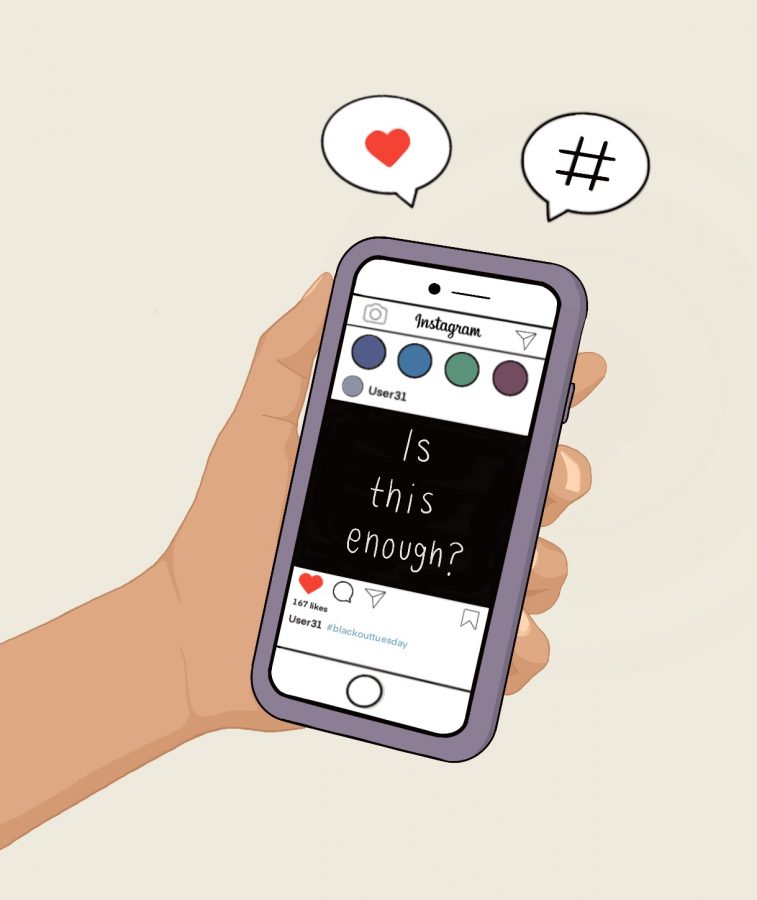Posing before posting: The dangers of performative activism
October 29, 2020
As you swipe through Instagram stories, you notice something new on your feed. Instead of the various beach photos or trending memes, there is a wave of posts addressing various concerns around the world. From asking for donations to providing links on how you can help, these posts advocate for the action that many think society lacks. However, you start to notice that behind some celebrities’ protest photos is a cameraman, signaling different poses that the celebrity should take. You then bring your attention to the countless black squares in your feed on Black Out Tuesday, and as you scroll through, you realize that you no longer see the helpful links or informational posts that once dominated the hashtag. Is this the change that our society wanted?
With shifting social dynamics and movements such as BLM, the younger generation is taking to social media to voice their thoughts and advocate for change, and Instagram, Tik-Tok, and Twitter have been especially popular for doing so. There are a variety of reasons why this form of advocacy is preferred over real life protests. First is due to its wide usage and the ability to reach a broader audience, allowing users to spread awareness while being educated themselves. This helps account for the fact that a younger audience might not be as caught up on the news, so spreading information through social media will get their attention quicker. Others say that it also provides a platform where people can understand others’ opinions, allowing discussions to happen in the comments or through direct messages. Additionally, given the possible restraints of activism in person, many claim that online activism provides an efficient way to communicate a message without having to account for extraneous factors.
Ksenia Gevorkova (11) has found that there is an ease and flexibility about social media activism that makes it accessible to many.
“Online activism is the kind of thing that any person can do and is very simple, unlike the activism in person,” Gevorkova said. “… I would participate in other forms of activism such as in-person rallies to support the causes I believe in. However, it is simply not an option due to my busy schedule and my lack of transportation. Online activism is also valid because it still makes a difference, even in minuscule ways. Online activism is how I find out about various issues across the globe, and I know that is the same for many other people… By speaking out, signing petitions, or even reposting things to your story, many issues are being given more limelight then they would without it.”
However, this rise in activism on social media isn’t always met with good feedback. There are concerns that just reposting or sharing a post on your story isn’t actually activism, since there is no action being taken other than just clicking a button. Some examples of performative activism include posing for pictures at a rally, the tagging chain where you would tag ten other people if you supported black lives, and Black Out Tuesday, in which supporters would post a black square in an effort to express solidarity with BLM without knowing the true significance of Black Out Tuesday.
Feminista Jones, an author and longtime advocate for BLM, noticed that this effort was contradictory to the movement’s goals. “It took seven years to get 11.9 million posts, and within seven hours, there were already a million more of them, mostly black boxes.” Jones, like many others, noticed that posting a black box would drown out all the previous posts that would bring awareness to the movement and provide helpful ways to contribute to it.
Gevorkova has noticed other downsides of performative activism as well. “There are many people who don’t take any steps to bring attention to any causes… Many feel like it is bad because it defeats the whole purpose of activism, as everything you speak out against, you should also care about. This has given online activism a bad reputation, as many do just use it to boost their social status, which is very upsetting. It also makes many discredit the change that online activism does bring, and how it can spark movements that move past the screen.”
This brings into question what kind of activism counts as actual change. There is a risk that users may only use activism to boost their social status or to show that they are following the same “trends” that others are, undermining the whole point of activism. Gevorkova believes that one should go out of their way to help if they are able to in order to spark real change.
“There are many people who don’t take any steps to bring attention to any causes. To truly say that you participate in activism, you shouldn’t just speak out when something is trending, and instead, make sure your opinion is known at all times,” Gevorkova said. “This can be done by informing others and yourself about the issues you are speaking out against, finding ways to spread your message, and also raising money or signing petitions for your causes.”
These negative effects of performative activism has led many to consider social media activism a trend, which will soon go away after a short period of time. However, many disagree and are against this portrayal of online activism. Dawson Dyneck (10) wants people to recognize the importance of using social media as a platform for activism.
“[Social media activism] is not a trend. We have to speak out about problems or they will never go away. If there is a fire in your living room and you just ignore it, isn’t it just going to get worse? We need to keep at the support, because if we don’t, more and more voices will go unheard, and the different movements in the world will get smaller and smaller.”
Treating social media activism as a trend has played a part in the increase of performative activism, leading some to post only when a major event has occurred. Behind the positive messages displayed on screen may be empty words that hold no real promise and are simply performative, preventing real change from occurring. However, Dyneck believes that one should take time to inform themselves and contribute to causes with a purpose and honest intentions.
“Remember you have every right to share how you feel and speak up about the things that are unjust and wrong,” Dyneck said. “Don’t care what others think of it, you have a voice. No one can take that away from you. Have strength, courage, compassion, and pride when you speak up. Even a little post can change the world. Even a little comment can change lots. But don’t be scared of it, embrace it. Always strive for a better, more equal world. A world where racism, homophobia, trandsphobia, and sexism is no more. Where hate is abolished. Where the people of the world are truly free.”









